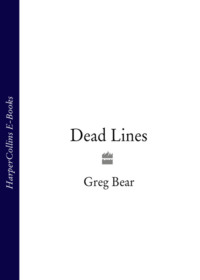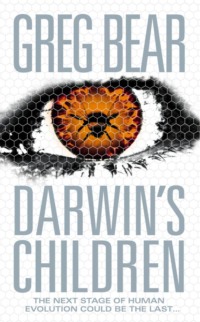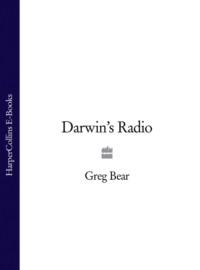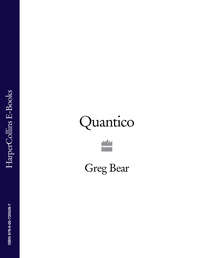
Полная версия
Vitals
‘That could be from the new one, Field 37,’ I guessed. I looked at the printed terrain map pasted between us, dotted with known vent fields in green, and six red vents roaring away along a recent eruption.
‘Maybe,’ Dave said. ‘Could also be Field 35. We’re four klicks east of both, and they swivel this time of year.’
The world’s seawater – all the world’s seawater – is processed through underwater volcanic vents every few million years. The ocean seeps through the sediment and porous rock, hitting magma sometimes only a few miles below the crust. Deep-ocean geysers spew back the water superheated to the temperature of live steam – well over 350 degrees Celsius. But at pressures in excess of 250 atmospheres, the water stays liquid and rises like smoke from a stack, cooling and spreading, warm and rich enough to be detected this high above the field: a megaplume.
‘Nadia tells me you’re looking for new kinds of xenos,’ Dave said. ‘Ugly little spuds.’
‘Interesting little spuds,’ I said.
Nearly every dive in these areas found xenos – xenophyophores, the single-celled tramps of the seafloor, some as big as a clenched fist. Xenos are distantly related to amoebae and resemble scummy bath sponges. They use sand as ballast, glue their waste into supports, and coat their slimy exteriors with debris as they roll around on the ocean floor. Their convoluted, tube-riddled bodies hide many passengers: isopods, bacteria, predatory mollusks. True monsters, but wonderful and harmless.
‘What’s so interesting about xenos?’ Dave asked.
‘I have a snapshot taken by some postdocs two months ago. They found what they called “sea daisy fields” north of the new vents, but they didn’t have a good fix on the position because one of the transponders had stopped sending. I examined a frozen specimen two months ago at the University of Washington, but it was all busted up, membranes ruptured. A specimen in formalin was nothing but gray pudding.’
Dave had already gotten a briefing on our dive. This was telling him nothing more than what he knew already. ‘Yuck,’ he said. ‘So what’s it to Owen?’
‘Right.’ I smiled.
Dave lifted his eyebrows. ‘I’ll just mind my own business and drive,’ he said, and rubbed his finger under his nose. ‘But I do have a master’s in ocean biochemistry. Maybe I can render some expert assistance when the time comes.’
‘I hope so,’ I said.
‘Is Owen interested in immortality? That’s what I’ve heard,’ Dave said.
‘I really don’t know.’ I closed my eyes and pretended to nap. Dave didn’t disturb me when he ran his check at five thousand feet. I don’t think he liked my attitude any more than I liked his.
Owen Montoya wanted to be a wallflower at the Reaper’s ball. That’s what had brought us together.
Set the Wayback machine, Sherman.
CHAPTER THREE
Three weeks before, a slender little blue helicopter, bright as a fresh bug, had buzzed me over Puget Sound to Anson Island. It was six o’clock on a Northwestern spring evening and the weather was gloriously lovely. I felt more alive than I had in a year, since the divorce from Julia.
I am normally a nervous flier, especially in choppers, but the young, square-jawed pilot, his eyes wrapped in metallic blue shades, was reassuringly deft, and I was too busy enjoying the view.
‘I was wearing my powder-blue suit,’ Philip Marlowe tells us in The Big Sleep, ‘with dark blue shirt, tie, and display handkerchief, black brogues, black wool socks with dark blue clocks on them. I was neat, clean, shaved and sober, and I didn’t care who knew it…I was calling on four million dollars.’
I wore a black cotton sports jacket and pants, wrinkled white-cotton dress shirt with black tie, high black socks, shiny black brogues – that much was the same – and I was calling on forty billion dollars. Owen Montoya could have bought and sold the Sternwoods a hundred times over, even accounting for inflation.
I had worn that same outfit when visiting other angels, financial backers visionary enough or cracked enough – sometimes I had a hard time telling which – to spend small fortunes on a microbiological Ponce de Leon. I hadn’t done too badly; my fancy footwork had kept me funded for the past five years.
I was no fraud. If the angels were smart, they sensed that I almost had the goods. If they were stupid – like Mr Song – they bought futures in snake-bladder extract.
I was very close. Just a little cash and a lot of very hard work, and I could jump the wall around Eden and find the ultimate treasure: vim and vigor for a thousand or ten thousand years, maybe longer, barring accidents or geological upheaval.
It was an amazing thought, and it never failed to give me chills.
The chopper performed a smooth bank to the north, and we flew over Blakely Point on Bainbridge Island. East of our flight path, midway between Bainbridge and Seattle, a cruise ship posed like a serene and well-fed lady on the fine ripples of the blue sea, her bow nosing into a bank of golden fog. Passengers gathered on a glassed-in observation deck below the soaring bridge, swam in three sparkling silver pools, spun around an open-air dance floor amidships. The kind of vacation Julia loved. At the end, she had started going on vacations without me.
Julia had ultimately found my talk about as exciting as a course in colonics. She had hidden her boredom for a few years, excited to be married to a young tenure-track comer at Stanford, a guy who regularly published little letters in Nature and longer discursions in The Journal of Age Research. But the gap in our minds, our educations, eventually wore her down. She complained she could not –
Enough of that shit. No way to spend eternity, moping over the past.
Two white-and-green car ferries plied the waters with more purpose and energy, their wakes crisscrossed by sailboats, catamarans, and cabin cruisers. Rich and powerful sailors everywhere, but how many had heard of me? How many would even care to listen to my ideas? Not many. They were like sheep running toward the slaughter chute, happily shaking their woolly heads, baa, baa.
I gritted my teeth and tried to enjoy the sunset doing a King Midas on the sound.
Thirty minutes out of Seattle, the chopper dropped a few hundred feet to circle a medium-sized island, lightly dotted with big, old, frame houses. We rounded a thinly wooded point to hover above a wide, deep cove. I squinted to riddle the mystery of a square, flat-topped floating object anchored a few hundred feet from the shingle-and-sand beach. Not a houseboat…
The golden glare off its white deck dimmed as we circled, and I made out a landing circle. It was a helipad, mounted high above the water on immense pontoons.
‘It’s a hundred feet on each side,’ the pilot told me, smiling with impersonal pride. ‘Equipped with refueling tanks, an automated weather station, and a repair shed. Impressive, isn’t it? The island association refused Owen permission to put a landing field on his property.’ He winked at such antiprogressive attitudes. ‘Owen floated one instead.’
I clenched my fists, but the pilot expertly, and with barely a judder, brought the little dragonfly down in the precise center of the landing circle. He waved to an attendant and switched off the engine. The blades slowed with a disappointed trill as two men in gray overalls clamped the rails to the deck.
The pilot released the passenger-side door and pointed to the edge of the pad. ‘Elevator and stairs over there. I’ll wait,’ and he smiled as if I were the most important man in the world. Next to his boss, of course.
As I walked toward the stairs, a breeze pricked the hair on my arms through my sleeves. Over my shoulder, I saw the pad crew, hooding the craft against salt spray.
Walking along the floating bridge to the beach, I had my first clear view of the house. Montoya’s mansion faced the cove with a thirty-foot-high window-wall. Six Dale Chihuly chandeliers hung behind the tinted glass, spaced evenly across the lobby like frozen purple and blue fireworks.
I had not spotted the house on the chopper’s approach, and now I understood why – the top was covered with patches of low forest, indistinguishable from much of the rest of the windswept island.
Betty Shun, Montoya’s personal assistant, walked across the beach as I reached the end of the bridge. About my age, give or take a couple of summers, she stood five and a half feet high. She had a pert, sensual, but not very pretty face capped by a mushroom of thick black hair. Her body was her prime asset and she knew it. A clinging black shift revealed many attractions, sculpted by much working out and, judging from the adipose structure of her round face, dietary determination. I sussed a fellow traveler, ready to grab life, shake it, and ask a few hard questions.
‘Dr Henry Cousins, I presume?’ Shun asked with a lovely lilt.
‘Hal,’ I corrected.
‘Hal. Welcome to Anson Island.’
The wall of glass and the mansion that lay hidden behind it bespoke a tasteful elegance that cared little for outward show. Montoya was no Trump or Vegas kingpin. Only from the cove did you know that a rich and powerful man spent time here.
‘Last week Owen hosted Gus Beck,’ Shun told me as we made the beachfront walk. ‘And Philip Castler the week before. He didn’t like what they had to say.’
‘Really? I’m shocked.’
Shun smiled. ‘So many wiseasses in this business,’ she said. ‘Be nice.’ I could sense her intelligence, competitive and fierce, like heat. I idled a stray masculine thought about conquest, then shut it off. Something about that face, that body. Shun, for all her charms, would be too spirited to stay with any man for long. At least, any man worth less than a billion dollars.
‘Gus was full of talk about uploading,’ she said. ‘You know, into silicon brains. I’ve never been much persuaded by that, have you?’
‘Not much,’ I agreed.
‘Philip was brilliant but far too vague. And he kept asking about money. That’s rude, and unnecessary. If Owen’s visionaries have their feet planted firmly on the Earth, money isn’t a problem.’
That was something I had learned long ago when going forth, hat in hand, to visit the Sternwoods of the world.
‘Owen and Philip had a bit of an argument, I’m sorry to say. Mr Castler went home red-faced and empty-handed.’ She smiled cheerfully, as if tallying sports scores.
Montoya had made his money off paper clips, or the equivalent in the cybernetic age: TeraSpin memory drives for home appliances, smaller, faster, cheaper, and denser than any others. Ten years ago he had been worth about a million dollars in stock – a few thousand in cash – and had lived in a ratty old Wallingford house west of the University of Washington. Now he was one of the richest men in a territory that on any financial map lay just a few degrees north of the Sultanate of Brunei.
I had never met so rich an angel, and I wondered what Montoya would be like. The last picture I had seen had been at least five years old. It is so easy to confuse the rich and the powerful with gods. Both can make or break you at a whim. The main difference is that our modern gods like to be called by their first names.
Shun reached up and straightened my collar as the tall glass doors slid aside. An odor of anise and crème de menthe filled the moist evening air.
CHAPTER FOUR
‘Almost there.’ Dave shook my shoulder and waved his hand at the pinging depth gauge, then switched on the bottom-scan sonar. We were about a hundred feet above the seafloor. A sound-etched picture of the terrain danced in ghostly blue waves across the display. The screen showed a stack of parallel lines between two walls of rock. The lines vaguely resembled a long rib cage.
‘Is that a dead whale?’ I asked, shifting right and reaching out to touch the LCD screen.
‘I doubt it,’ Dave said. ‘We’re coming down right over it. Let’s take a look-see.’
‘Dead whales are cool,’ I said. ‘They’re like gas stations in the desert. Propagules move from corpse to corpse on the seafloor. Some get to the vents and set up shop for good.’
‘That’s one theory,’ Dave allowed. ‘But I still don’t think it’s a whale.’
He pulled a graduated lever and the DSV shuddered as we dropped most of our steel ballast. ‘We’ll try for ten pounds below neutral. “Dance like a butterfly, sting like a bee.”‘ He pushed compressed air into the ballast tanks until we reached neutral buoyancy. Then he aimed the thrusters down and slowed our descent.
We hovered at about fifty feet, the sonar pinging insistently. He turned off the thrusters to avoid raising a cloud of silt.
‘Get that bottom light bar,’ he suggested.
I flipped the switch that turned on a bank of lights mounted directly below the pressure sphere.
‘I’m going to move some ballast forward.’ Dave pitched the nose down thirty degrees, giving us a wide-angle view of the bottom, and propelled us forward in controlled ‘flight,’ much more precise than weighted free fall. The DSV frame was equipped with a little railway system of steel weights that could be shifted fore and aft, or port and starboard, to adjust trim. This saved the sub from using thrusters, conserving power. The more power we kept in reserve, the longer we could stay on the bottom.
Dave thrust his hand into the data-glove box, a plastic cage containing a wire-lined black glove. With his left hand, he touched the instrument display and switched control of the lights to the glove. He expertly wriggled and pinched and twisted his fingers. The lights burned through a thin, whirling cloud of debris and flung brilliant white ovals on a small wooden fishing boat.
Not a whale after all.
‘It’s the Castle Rock II,’ he said with a dry chuckle. ‘An old wreck.’ The boat’s cabin thrust upright, intact after its long drop through the night, but the windows yawned broken and black like empty eye sockets. The crushed and splintered deck and hull showed the boat’s wooden ribs. ‘I thought I recognized it, but it’s been a couple of years. Field Number 37 should be a few hundred meters north, if we follow this shallow canyon. A little current today, but it seems to be on our side.’
I looked over the shattered hulk, lost in cold and perpetual dark, and wondered about the weather above. Would our recovery go smoothly? Last trip, we had spent three hours in foaming, choppy sea, our beacons flashing, before being hauled aboard the Sea Messenger.
All around us, the seafloor was covered with broken sheets of lava like lost pieces of a giant’s puzzle. The canyon walls, no more than fifty feet to either side, were not visible in the murk. The side-scanning sonar revealed that we were surrounded by what looked like columns in an ancient temple. Once, a lake of magma had pooled in the canyon and crusted over. Splits in the cap had allowed seawater to seep through and solidify the columns. The lava beneath the crust had then drained. As the molten basalt retreated, the sea had crushed the cap. Only the columns remained.
Dave pushed Mary’s Triumph backward with a few spurts of the thrusters. I could make out the fishing boat’s name, just as Dave remembered it, painted in a broken arc on the smashed stern.
‘Let’s go east,’ Dave said. ‘And up a bit. The boat dragged a few lines behind her when she went down.’
CHAPTER FIVE
We met in the mansion’s Great Room, as Betty Shun described it, almost sixty feet long and thirty feet wide. This was the room that smelled of anise and crème de menthe. Skylights hidden in the forest above dropped the day’s last filtered green light on a broad mahogany desk covered with magazines, newspapers, and a small laptop computer. Couches upholstered in rich yellow fabric awaited our attentions, like the laps of generous houris. The furniture floated on a velvety-smooth mauve carpet accented by white moons and antique yellow suns.
Betty Shun introduced us and gave Montoya a packet she had printed out a few minutes earlier. Then she left, wagging her finger and saying, with a smile, ‘You boys be good.’
Montoya held out his hand. I gripped it and judged it, which is always unfair and completely natural: skin moist, pressure light. A polite handshake. He was good looking in a rugged way, with a short, pushed-up nose and probing black eyes. His cheeks had been pocked by youthful acne and a thin black nubbin of beard adorned his chin. His smile was quick but shy. His clothes fit loose but well, and his sandals were old friends, worn and comfortable. Montoya would not have impressed anyone had they met him on a street corner.
He invited me to sit at a long, ornate brass and maple bar.
‘Welcome to the Fortress of Solitude,’ he said. ‘I’m the butler. Betty is really Supergirl. Coffee now, wine with dinner at eight, Madeira for dessert, and late-night chat, if you’d care to stay.’ He went behind the bar. ‘What’s your jolt?’
‘Latte,’ I said. ‘Please.’
Montoya had sold TeraSpin three years earlier and spent most of his time serving on the boards of charities. He had given grants and funded scholarships for more than sixty universities around the world.
He stood before the professional espresso machine and hummed the theme from The Empire Strikes Back as the valve roared and spat. Having my milk steamed by one of the world’s wealthiest men was intriguing. I thought there was a touch of ennui in his eyes, but it’s easy to overanalyze the rich. Maybe he looked that way because he had been disappointed so often.
‘Did Betty tell you about Gus and Phil?’ Montoya asked as he poured foam and hot milk from the small steel pitcher.
‘She did,’ I said.
Being around Gus Beck made me nervous. He was twitchy and far too brilliant. I never knew when he might erupt in a fit of righteous technical criticism. Phil Castler was just the opposite – old-world gracious, fierce in debate but otherwise mild and self-effacing.
Montoya sprinkled cocoa over the peak, handed me my latte, and came around the bar carrying another mug filled with plain black coffee. He sat on the stool next to mine. ‘And?’
I smiled. ‘Uploading into cyberspace, living in a computer or a robot brain, immortalized in hardware, in silicon…’
‘Makes you laugh?’ Montoya asked, sipping.
‘No. I just don’t think it’ll happen in time for me and thee.’
‘Tell me why,’ Montoya asked primly.
‘The devil is in the details. The mind is the body. Gus is still back with Descartes in believing they can be separated.’
‘Explain.’
‘Downloading the brain’s patterns isn’t enough. Everything you know and think is embedded in your neurons, but your consciousness is in the cells of your entire body. Your mind is really a complex of brains, with major contributions from the nervous and immune systems. The flesh is intelligent, all flesh, and all of it contributes to your personality at one level or another. Take the body away, and you become near-beer, bitter without the kick.’
Montoya chuckled and looked away, rubbing one hand on his breast. ‘Why not capture the state of each cell, each neuron, in a computer? A super MRI machine could do something like that, right?’
‘Each one of our cells is like a huge factory with thousands of machines and workers. What the cells do, the decisions they make, how they live, contributes to what you think and how you behave. We won’t capture that much detail in any artificial memory in our lifetime. Even if we could, one human being would probably fill all the computer capacity on Earth.’
Montoya nodded. ‘What about Castler – sending in nano-machines and cleaning up an aging body?’
Easy questions so far. ‘It’s a good scheme, quite possible, but how old are you, Owen?’
‘Forty-five,’ he said.
‘You’ll be ninety before nanotech is proven and safe. Fifty years creeps up awfully fast.’
I was playing down the prospect of Phil’s success a little; thirty years was not unlikely.
‘You’re not just saying that to get me to fund you?’
‘I think Gus and Phil are brilliant. I encourage you to fund them both. But their ideas are longer-term.’
‘They hate being told that,’ Montoya said. He looked at me squarely. ‘How are your theories any more convincing?’
‘I won’t turn you into a corpsicle and hope somebody knows how to fix you in a hundred years. I won’t shave you down neuron by neuron, then upload you into some memory bank no one has even begun to design. I can begin to increase our life span in the next few years, with minimal intervention. If you and I want to stay young and healthy longer,’ I said, closing in, ‘our only hope is medical maintenance, keeping our bodies vigorous. Specifically, mitochondrial chromosome adjustment.’
‘Beck turned red when I told him I was meeting with you,’ Montoya said. ‘He said you were insufferably arrogant. He said you were re-hashing theories proven wrong back in the nineteen twenties. I thought about asking Betty to fetch him a spit-cup.’
‘There’s a lot of passion there,’ I said. Gus and Phil were my rivals and might have called me a fool once or twice, but they deserved a modicum of respect, even from a man as wealthy as Montoya.
‘I agree, they’re way off track,’ Montoya said. ‘They’ll never see the promised land. I’ve read your papers. I like them. Tell me more.’
CHAPTER SIX
‘That’s new,’ Dave said, swiveling the DSV and shining our upper bank of floods on a clump of tube worms. Beyond the worms, the sub’s lights shimmered through white clouds like old, chalky paint: a bacteria-rich spring, small in diameter but productive.
‘Let’s see.’ He sidled the sub in a few meters. I pulled down my data glove, feeling the plastic limiter box click into place, guided a sensor-laden mechanical arm, and pushed a probe into the spring outflow.
‘Shove it, shove that old rectal thermometer right into the Earth’s fundament,’ Dave said with another leer. He wasn’t funny. ‘Eighty-six degrees Celsius,’ he said.
‘Congratulations.’
‘I’m just the pilot,’ he said matter-of-factly. ‘You’re the researcher. You’ll get the credit.’
CHAPTER SEVEN
Montoya listened to my presentation for two hours. We broke for a quick dinner – crab cakes and stir-fried vegetables, served with an excellent Oregon pinot gris. We were studying each other, and neither of us was willing to reveal too much. Looking a little glazed, he called a break at ten p.m. Betty Shun appeared to take me on a tour of the house while Montoya fielded some phone calls.
The glass wall fronted the east wing. The west wing ended in a boat launch built into the native rock of another cove. It easily doubled what had at first seemed merely huge. The floor plan of Montoya’s Fortress of Solitude had to total a hundred thousand square feet – two and a third acres, topped by wind-winnowed forest, the air-conditioner vents camouflaged as tree stumps and the condensers as moss-covered boulders.
‘Don’t try to take this tour on your own, Dr Cousins,’ Shun warned me on the clay floor of an indoor tennis court. ‘Without a permission wand, you’ll be locked in the first room you enter.’ She held up a tiny plastic bar. ‘Security will have to come and save you.’ She looked at her wristwatch. ‘Owen doesn’t need a wand. The house recognizes him on sight. His steps, his voice –’
‘His DNA?’
She smiled and tapped her watch. ‘Owen should be ready now. We are exactly a hundred and fifteen feet from him, as the laser flies.’ She gave me a look that might have spoken volumes, but I was unable to open, much less read, any of them. ‘Why were you let go from your last research job?’
‘At Stanford?’
She nodded.
‘Money ran out in my department. I was junior.’






